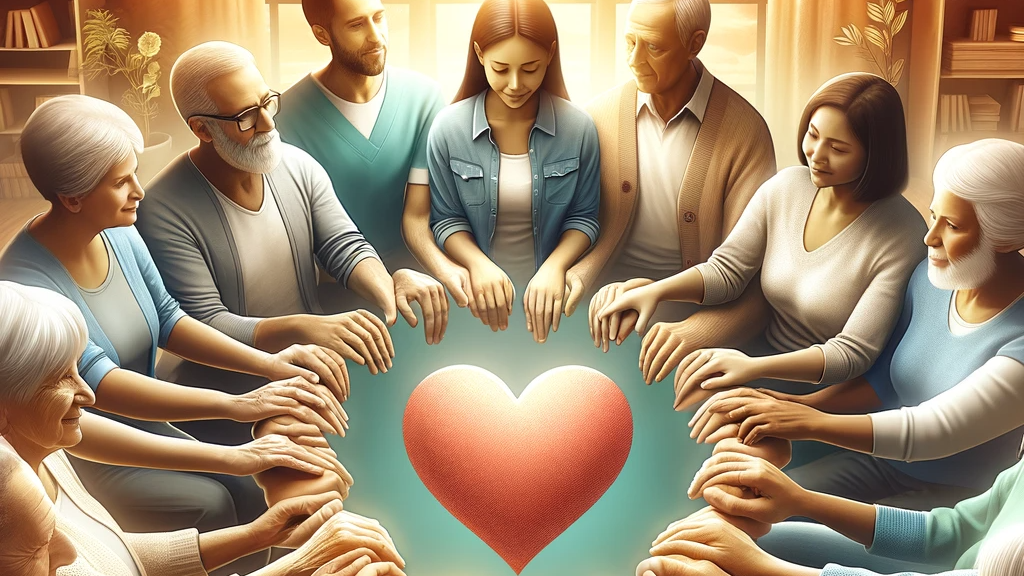Empowering Family Caregivers: Building a Caregivers Support Group Team Partner
Building a caregiver support group empowers family caregivers by fostering connection, sharing resources, and offering emotional support. Learn how to create a strong team of partners who understand the journey and help ease the caregiving burden.

In the intricate tapestry of life, the role of adult caregivers often remains hidden, yet it’s pivotal in supporting the fabric of our society. These caregivers, particularly those caring for the elderly, embody the true essence of the act of caring. They tirelessly commit to supporting their loved ones, often at the cost of their own health and financial stability. This scenario underscores a public health crisis, calling for an urgent need to redefine caregiving and support these heroes.
The caregiver space community plays a crucial role in providing resources, encouragement, and free expert support for caregivers, fostering a sense of connection and solidarity among those caring for loved ones with chronic conditions, disabilities, or older adults.
Over two decades ago, I stepped into the realm of caregiving, combining my professional healthcare knowledge with personal experience as a family caregiver. I witnessed firsthand the toll of caregiving on individuals who often become homeless or impoverished post-caregiving. This alarming situation led me to launch www.caregiverrelief.com, a platform designed to alleviate the hardships faced by seniors and their caregivers.
The Journey of a Caregiver:
As you embark on this caregiving journey, it’s essential to understand that you are not alone. Many have walked this path before you, and many more will follow. Caregiving is a journey that evolves over time, sometimes gradually, and at other times, it thrusts you into a whirlwind of responsibilities. It is a journey marked by the ebb and flow of life’s unpredictable nature and it often necessitates a level of dedication that you may not have anticipated. Programs and resources designed to assist caregivers are crucial in providing the support and guidance needed during this challenging time.

Sharon's Story: A Sacrifice of Love and Survival
Sharon, a dedicated editor for a book company, had meticulously planned her life to extend well into her 70s. She had weathered the storms of life, serving as the primary caregiver for her husband until his untimely passing at a young age. As a single mother, she had faced the challenges of making ends meet while caring for her husband and young son. Sharon had finally reached a point in her life where the pieces were falling into place. She was making a comfortable living, her son had embarked on his own journey, and it was finally her time to shine.
However, Sharon’s world was soon turned upside down when she began to notice the telltale signs of dementia in her beloved mother, Grace. The forgetfulness, missed appointments, and unpaid bills were just the beginning. Sharon knew it was time to confront the issue and seek medical advice. The diagnosis was heart-wrenching – Alzheimer’s disease. To compound the difficulty, Grace was already in the middle stages of dementia, which meant that her care needs were substantial.
Sharon learned about the dementia caregiver center, a vital resource hub staffed by trained professionals who provide information and support. These centers offer specialized support groups tailored to different stages of the disease, which could be invaluable for her journey as a caregiver.
With a heavy heart, Sharon made the heartrending decision to take an early retirement and devote herself to providing the best possible care for her mother. She moved into her mother’s home, leaving her rental behind, and was ready to face the challenging road ahead. It was only after moving in that Sharon discovered that her mother had taken out a second mortgage on the house. The mounting bills quickly consumed her mother’s savings and began to deplete Sharon’s modest retirement fund as well.
Amid the mounting challenges, Sharon found solace in a support group where she shared her situation. She was experiencing a whirlwind of emotions – fear, overwhelm, and a profound sense of isolation. As her mother’s condition continued to deteriorate, the prospect of losing her was both heart-wrenching and terrifying.

In the midst of these emotional struggles, a suggestion was made for Sharon to consider palliative care or hospice to support her mother and herself during this painful journey. Sharon took the step of placing her mother in hospice care, hoping it would provide the comfort and support needed in the final stages of life. However, within a week of hospice care, Sharon felt a deep sense of unease and believed that hospice was hastening her mother’s decline.
Facing the thought of losing her mother proved to be unbearable, and Sharon found herself at a crossroads. She made the difficult decision to have a feeding tube put in place, driven by a powerful need to hold onto her mother for as long as possible.
Tragically, the weight of Sharon’s situation, compounded by the looming fear of homelessness, unemployment, and financial ruin after her mother’s passing, took its toll. Sharon’s health deteriorated rapidly, ultimately leading to a serious heart condition that claimed her life just a year after her mother’s passing.
Sharon’s story is, unfortunately, one that resonates with many family caregivers who shoulder the immense burden of caregiving. Chronic stress, social isolation, and a sense of helplessness can take a severe toll on both physical and emotional well-being. Sharon’s story serves as a poignant reminder of the sacrifices made out of love and the dire need for support and resources for family caregivers who find themselves navigating the intricate and often overwhelming world of caregiving. I learned very early on in my career as a nurse, that family caregivers make decisions based on emotions, not logic.

Why A Care Team Partner Support Group?
The growing aging population has escalated the demands on family caregivers, making it more challenging than ever before. My response to this crisis is the conception of Care Team Partner Support Groups. These groups aim to connect family caregivers, offering them much-needed support and resources, thus ensuring they are not left to shoulder the burden of caregiving alone. Additionally, 'Caregivers Connect' serves as a dedicated support group designed to empower caregivers by providing them with a platform to share experiences, seek advice, and access valuable resources.
This article is the first in many, as we beginning a journey towards changing the world for family caregivers. It delves into the principles of Care Team Partner Support Groups, offering guidance and inspiration for creating these lifelines. The objective is to acknowledge and empower family caregivers, ensuring they receive the support they deserve. A group for caregivers is essential in providing support and alleviating stress, highlighting the importance of sharing experiences and coping strategies in a supportive environment.
Benefits of Caregiver Support Groups
Caregiver support groups offer numerous benefits for family caregivers, making them an invaluable resource in the caregiving journey. Here are some of the key advantages:
- Emotional Support: Caregiver support groups provide a safe space for caregivers to share their feelings, concerns, and experiences with others who understand the challenges of caregiving. This emotional support can be a lifeline during difficult times.
- Practical Advice: These groups offer practical advice and tips from experienced caregivers, helping new caregivers navigate the caregiving journey more effectively. Learning from others’ experiences can be incredibly beneficial.
- Connection and Community: Support groups foster a sense of connection and community, reducing feelings of isolation and loneliness. Being part of a group where everyone understands your struggles can be immensely comforting.
- Access to Resources: Many support groups provide access to helpful resources, such as educational materials, workshops, and online forums. These resources can equip caregivers with the knowledge and tools they need to provide better care.
- Improved Mental and Physical Health: Studies have shown that caregivers who participate in support groups experience improved mental and physical health, including reduced stress and anxiety. The support and camaraderie found in these groups can significantly enhance overall well-being.
Discovering the Heart of Online Support Groups for Care Team Partners:
“What is a Care Team Partner Support Group, and why do I need one?” This question is crucial in understanding the importance of these groups. Caregiving, often seen as intermittent acts of kindness, can unexpectedly evolve into a full-time responsibility. Many family caregivers don’t initially identify as such, viewing their role more as a moral obligation than a defined caregiving position. This perspective, while noble, can lead to a lack of awareness about available resources and support, contributing to feelings of isolation and burnout.

In my experience, I’ve observed that decisions made by caregivers are often emotionally driven rather than logical. While emotions are a natural part of caregiving, relying solely on them can lead to subjective and inconsistent decision-making, potentially resulting in caregiver burnout. Care Team Partner Support Groups provide a balanced perspective, combining empathy with logic and experience, thereby enhancing the caregiving experience.
These groups serve as a beacon of hope and understanding, providing a platform where caregivers can share experiences and find support. Groups for caregivers are essential support networks that help in reducing the emotional and physical toll of caregiving and guide caregivers in making more informed decisions. The care team partners offer practical assistance to the care recipient and the primary caregiver.
Types of Support Groups
There are various types of support groups available for caregivers, each offering unique benefits and opportunities for connection.
Online Support Groups
Online support groups offer a convenient and accessible way for caregivers to connect with others from the comfort of their own homes. These groups can be especially helpful for caregivers who live in rural areas or have limited mobility.
- Benefits of online support groups include:
- Increased accessibility, allowing caregivers to join from anywhere.
- Flexibility in scheduling, making it easier to fit meetings into busy caregiving schedules.
- Ability to connect with caregivers from diverse backgrounds and experiences, broadening perspectives and support networks.
- Examples of online support groups include:
- Online forums and discussion boards where caregivers can post questions and share experiences.
- Social media groups dedicated to caregiver support, offering a platform for real-time interaction.
- Video conferencing groups that provide face-to-face interaction without the need for travel.
In-Person Support Groups
In-person support groups offer a face-to-face connection with others who understand the challenges of caregiving. These groups can be especially helpful for caregivers who value in-person interaction and community building.
- Benefits of in-person support groups include:
- Face-to-face interaction and community building, fostering deeper connections.
- Ability to connect with local resources and services, providing practical support.
- Opportunity to build relationships with other caregivers, creating a strong support network.
- Examples of in-person support groups include:
- Local caregiver support groups that meet regularly in community centers or other local venues.
- Community centers that host support group meetings and provide additional resources.
- Hospitals and healthcare organizations that offer support groups as part of their services.
Overcoming Barriers to Seeking Support
Despite the benefits of caregiver support groups, many caregivers face barriers to seeking support. Common barriers include:
- Lack of Awareness: Many caregivers are unaware of the existence of support groups or do not know how to find them. To overcome this, caregivers can seek out online support groups, which offer increased accessibility and flexibility. Additionally, reaching out to local organizations and community centers can help identify available support groups.
- Stigma: Some caregivers may feel embarrassed or ashamed to seek support, fearing that it will be perceived as a sign of weakness. It’s important to remember that seeking support is a sign of strength and self-care. Caregivers can ask healthcare providers or social workers for recommendations to find supportive and understanding groups.
- Time Constraints: Caregivers often have limited time and energy, making it difficult to attend support group meetings. Prioritizing self-care and making time for support group meetings can be beneficial. Online support groups offer flexibility, allowing caregivers to participate at their convenience.
- Transportation: Caregivers may face transportation barriers, making it difficult to attend in-person support groups. In such cases, online support groups can be a valuable alternative. Additionally, seeking support from family members or friends who can provide emotional support and help with caregiving responsibilities can alleviate some of the burden.
By addressing these barriers and seeking out the appropriate support, caregivers can find the emotional and practical assistance they need to navigate their caregiving journey more effectively.
The Power of Care Team Partner Support Groups:
Care Team Partner Support Groups are a source of strength, compassion, and unwavering support. They provide a safe space for caregivers to express their fears, frustrations, and triumphs. These groups are essential in preventing burnout, alleviating feelings of isolation, and offering insights into managing the complexities of caregiving.

The goal of this article, and the essence of my mission, is to promote the development of Care Team Partner Support Groups. These groups are crucial in providing education and practical support for the needs of family caregivers, ensuring that each family member receives the care they need. Additionally, I urge the support of the Caregiver Relief Family Caregiver and Direct Care Worker petition, emphasizing the importance of building a solid network for caregiving support.
Mental Health America is a valuable resource for caregivers facing mental health challenges, offering support and assistance during tough times.
Together, we can create a brighter future for family caregivers, one Care Team Partner Support Group at a time, ensuring they receive the care, understanding, and compassion they need to navigate their challenging path.
For those seeking caregiver information, accessing resources and support is crucial.
Want to Learn More on building a care team partner support group? Check out our How to Become a Patient Care Advocate for your Family Caregiver
Please share stories about your caregiving journey to hep others know they are not alone.
Our Resources section can help you find the information and tools that you need. We have courses, videos, checklists, guidebooks, cheat sheets, how-to guides and more.
You can get started by clicking on the link below. We know that taking care of a loved one is hard work, but with our help you can get the support that you need.
Click here to go to Resources Section now!



